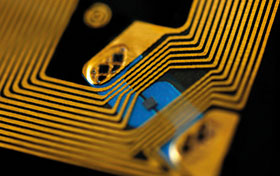MIT and TI team up for hack-proof RFID chips
24 February 2016
News

MIT researchers have developed a new type of radio frequency identification (RFID) chip that is extremely difficult to hack.
If such chips were widely adopted, it could mean that an identity thief couldn’t steal your credit card number or key card information by sitting next to you at a café, and high-tech burglars couldn’t swipe expensive goods from a warehouse and replace them with dummy tags. Texas Instruments has built several prototypes of the new chip, to the researchers’ specifications, and in experiments the chips have behaved as expected.
The chip is designed to prevent so-called side-channel attacks which analyse patterns of memory access or fluctuations in power usage when a device is performing a cryptographic operation, in order to extract its cryptographic key. Since a given execution of the cryptographic algorithm only leaks a slight amount of information, a hacker needs to execute the cryptographic algorithm with the same secret many, many times to get enough leakage to extract a complete secret.
One way to thwart side-channel attacks is to regularly change secret keys. In that case, the RFID chip would run a random number generator that would spit out a new secret key after each transaction. A central server would run the same generator, and every time an RFID scanner queried the tag, it would relay the results to the server, to see if the current key was valid.
Such a system would still, however, be vulnerable to a ‘power glitch’ attack, in which the RFID chip’s power would be repeatedly cut right before it changed its secret key. An attacker could then run the same side-channel attack thousands of times, with the same key. Power-glitch attacks have been used to circumvent limits on the number of incorrect password entries in password-protected devices, but RFID tags are particularly vulnerable to them, since they’re charged by tag readers and have no onboard power supplies.
Two design innovations allow the MIT researchers’ chip to thwart power-glitch attacks. One is an on-chip power supply whose connection to the chip circuitry would be virtually impossible to cut, and the other is a set of non-volatile memory cells that can store whatever data the chip is working on when it begins to lose power.
Further reading:
Electronic News Digest
News
A brief synopsis of current global news relating to the electronic engineering fields with regards to company finances, general company news, and engineering technologies.
Read more...
4000 A containerised DB for power project
News
Power Process Systems has successfully completed the design, fabrication, and commissioning of a 4000 A containerised distribution board for a wind/PV solar hybrid renewable energy project.
Read more...
Datacentrix Industrial Indaba 2025
News
Datacentrix recently hosted its inaugural Industrial Indaba 2025, where industry leaders explored how digitalisation, resilience, security and compliance are shaping the future of sustainable industrial operations in Africa.
Read more...
RS brings solar light to 150 000 people
RS South Africa
News
The company’s three-year partnership with SolarAid aims to raise £1 million through corporate donations, matched funding, product contributions, and fundraising to accelerate access to safe, sustainable energy.
Read more...
Microchip and AVIVA Links collaboration
Altron Arrow
News
Microchip and AVIVA Links have achieved groundbreaking ASA-ML interoperability, accelerating the shift to open standards for automotive connectivity.
Read more...
World’s leading supplier of grid automation products
News
Hitachi Energy was recognised as the global market share leader in grid automation for electric power transmission and distribution utilities by ARC Advisory Group.
Read more...
Vivashan Muthan appointed as head of export sales and operations at RS South Africa
RS South Africa
News
With a career spanning engineering, business development, and sales leadership across sub-Saharan Africa, Vivashan Muthan brings a wealth of expertise to his new role as head of export sales and operations.
Read more...
Google equips university students across Africa with free access to advanced AI tools
News
A 12-month Google AI Pro plan has been launched for students in Ghana, Kenya, Nigeria, Rwanda, South Africa, and Zimbabwe to build foundational AI skills.
Read more...
Africa’s space economy projected to be worth $22,6 billion in 2026
News
South Africa is gearing up to be at the forefront of the growth in the space industry, creating thousands of jobs, driving innovation, and boosting the national economy.
Read more...
Distribution partnership with MacDermid Alpha
Testerion
News
MacDermid Alpha Electronics Solutions India Private Limited has announced that as of 01 September 2025 Testerion will be the sole importer and distributor of their products to the South African market.
Read more...


